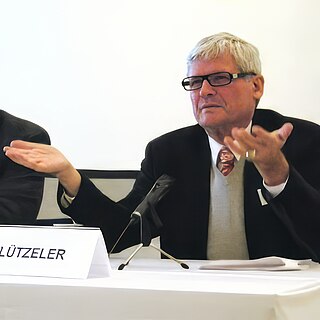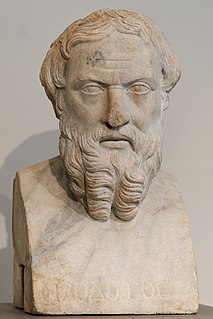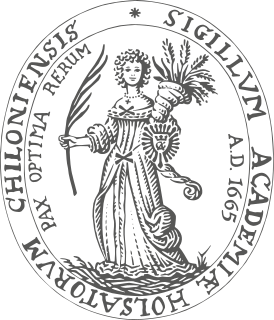Otto Kaiser was a German Old Testament scholar.
Gottfried Boehm is a German art historian and philosopher.

Gibuld the last known king of the Alamanni before the defeat of the Alamanni at the battle of Tolbiac in 496.
The Lex Quisquis was issued by the Roman emperors Arcadius and Honorius in 397 as an expansion of the Roman law of treason. Up to this time, treason had been defined as any action against the Roman state by the Julian law on treason. The lex Quisquis added the murder of counsellors to the list of crimes, which in medieval society evolved into the idea that assaulting a royal officer was a treasonable act.
Norbert Angermann is a German historian.

Paul Michael Lutzeler is a German-American scholar of German studies and comparative literature. He teaches as Rosa May Distinguished University Professor in the Humanities at Washington University in St. Louis.

Kuno Lorenz is a German philosopher. He developed a philosophy of dialogue, in connection with the pragmatic theory of action of the Erlangen constructivist school. Lorenz is married to the literary scholar Karin Lorenz-Lindemann.
The Treaty of Dorpat (Tartu) was concluded in May 1564, during the Livonian War. Ivan IV of Russia accepted the subordinance of Reval (Tallinn) and some Livonian castles to Erik XIV of Sweden, and in turn Erik XIV accepted the subordinance of the rest of Livonia to Ivan IV. Subsequently, Russia and Sweden agreed on a seven-years' truce.
Ingolf Ulrich Dalferth is a philosopher of religion and theologian. His work is regarded as being on the methodological borderlines between analytic philosophy, hermeneutics and phenomenology, and he is a recognized expert in issues of contemporary philosophy, philosophy of religion, and philosophy of orientation.

The Excarpsus Cummeani, also called the Pseudo-Cummeani, is an eighth-century penitential, probably written in the north of the Frankish Empire in Corbie Abbey. Twenty-six copies of the manuscript survive; six of those were copied before 800 CE. It is possible that the penitential, which extends its scope beyond monasticism to include clerics and lay people, has a connection to Saint Boniface and his efforts to reform the Frankish church in the first half of the eighth century. Geographic spread by the end of the eighth century and continued copying of the manuscript into the 9th and 10th centuries have been interpreted to mean the work was considered "by the Christian authorities" a canonical text. It was used as late as the eleventh century, "as the main source of the P. Parisiense compositum".
Gerhard Johannes Botterweck was a German theologian, Old Testament scholar and dean of the Catholic Theological Faculty of the University of Bonn. He is best known for his multi volume work the Theological Dictionary of the Old Testament.
Michael Glatthaar is a German scholar of the Middle Ages, specializing in the documents of the Carolingians and the study of Saint Boniface. A student of Hubert Mordek, he is the author of Bonifatius und das Sakrileg (2004), a study of the saint's influence on the concept of sacrilege in the 8th-century church and afterward. In his study he identifies a number of sententiae in a Wurzburg manuscript as connected to Boniface, proposing the title Sententiae Bonifantianae Wirceburgensis for the fifty-four capitula and chapter headings in the manuscript. He has argued for the authenticity of the 716 capitulary of Pope Gregory II which invested three papal legates with the organization of the church in Bavaria, and for its close connection to Boniface's sphere of influence.

The Paenitentiale Theodori is an early medieval penitential handbook based on the judgements of Archbishop Theodore of Canterbury. It exists in multiple versions, the fullest and historically most important of which is the U or Discipulus Umbrensium version, composed (probably) in Northumbria within approximately a decade or two after Theodore's death. Other early though far less popular versions are those known today as the Capitula Dacheriana, the Canones Gregorii, the Canones Basilienses, and the Canones Cottoniani, all of which were compiled before the Paenitentiale Umbrense probably in either Ireland and/or England during or shortly after Theodore's lifetime.

The Collectio canonum Quesnelliana is a vast collection of canonical and doctrinal documents prepared (probably) in Rome sometime between 494 and (probably) 610. It was first identified by Pierre Pithou and first edited by Pasquier Quesnel in 1675, whence it takes its modern name. The standard edition used today is that prepared by Girolamo and Pietro Ballerini in 1757.
Horst Wolfgang Böhme is a German archaeologist with a focus on Late Antiquity / Early Middle Ages and research into castles.
The Diet of Metz was an Imperial Diet of the Holy Roman Empire held in the imperial city of Metz from 17 November 1356 to 7 January 1357, with Emperor Charles IV presiding. It is most memorable for the promulgation of the Golden Bull of 1356.

Lorenz Hubert Weinrich is a German historian.
Klaus Zechiel-Eckes was a German historian and medievalist.
Heiko Steuer is a German archaeologist, notable for his research into social and economic history in early Europe. He serves as co-editor of Germanische Altertumskunde Online.
Etherius was bishop of Lyon, successor of Priscus. Etherius died in 602 and is a Roman Catholic and Orthodox saint, celebrated locally on October 7. He is notable as the bishop who consecrated Augustine of Canterbury to go to England.














